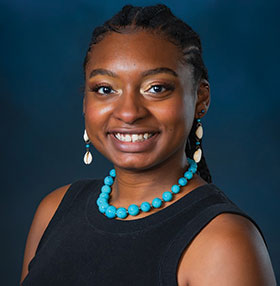Elon’s Story:
Spring
2022
Pathways - Advice from Experienced Voices
Elon’s Story:
A path shaped by conferences, community, and mentoring
By:Elon Price, 2018 SPS Summer Intern and PhD Student, Auburn University
 When I started working toward an undergrad degree in physics, I wasn’t sure what I was in for. My family and I didn’t know much about astrophysics as a career, and we didn’t know of any Black, female astrophysicists at the time either. My dad told me it would probably be a White- and male-dominated field. My parents warned me that I might feel isolated sometimes and experience discrimination, but that made me only more determined.
When I started working toward an undergrad degree in physics, I wasn’t sure what I was in for. My family and I didn’t know much about astrophysics as a career, and we didn’t know of any Black, female astrophysicists at the time either. My dad told me it would probably be a White- and male-dominated field. My parents warned me that I might feel isolated sometimes and experience discrimination, but that made me only more determined.
After a few years of working toward a physics bachelor’s degree, I started to feel constantly overwhelmed by the various stressors in my life—including more responsibilities at work and harder courses. One day I got an email from a professor about a conference of the National Society of Black Physicists (NSBP) that offered free travel and lodging to students who wanted to attend. I had no idea this kind of thing even existed or that there were many Black physicists out there. I decided to attend.
During that NSBP conference I experienced the value of networking and connecting to the broader physics community. I finally started to feel a sense of belonging in physics. Other conferences presented unique opportunities too. One even led me to a Society of Physics Students summer internship. Participating in that internship taught me a lot about physics professional societies and the myriad of physics careers and research areas.
During my undergrad years, I also found time to serve as a mentor. I volunteered for many summer sessions with Imhotep Academy, a program that teaches elementary and middle school students from underrepresented groups about careers in STEM. As an alumna, it meant a lot to me to give back to the program that first exposed me to laboratory research. My experiences with Imhotep over the years taught me the importance of mentor–mentee relationships and the impact they can have on a student’s education and career.
When the time came for me to apply to graduate schools, I had a lot of resources but was still nervous. I was knowledgeable about physics and had a clear picture of my career goals, but I also knew about the increased underrepresentation of minority students in physics at the graduate school level. And I understood the importance of belonging and effective mentoring. As I learned more about the many bridge programs that support underrepresented minority students in the transition from undergraduate degree to physics PhD program, I was inspired to apply.
Ultimately, I enrolled in the Fisk University–Vanderbilt University Master’s-to-PhD Bridge Program and completed a master’s degree at Fisk. The experience only reinforced my career goals. The support I received boosted my confidence and affirmed my physics identity, and in the positive, encouraging environment, my coursework and overall understanding of physics improved. The skills I gained have prepared me well for obtaining a physics PhD, which I’m doing now at Auburn University.
My advice to students planning their physics career is to use networking to your advantage. Obstacles will arise, and it’s reassuring to have an established network you can rely on for guidance. Mentoring is important, and mentors can come from many places, including conferences, internships, research experiences, and department faculty, among others. Ultimately, your mentors and community can help you make solid career choices that align with your interests. //
This story was originally published in the 2021 edition of GradSchoolShopper magazine.
To learn about the National Society of Black Physicists, visit the NSBP website at nsbp.org.
Student members of the Society of Physics Students are eligible for free membership in NSBP; for details, see spsnational.org/about/partnerships/nsbp.
